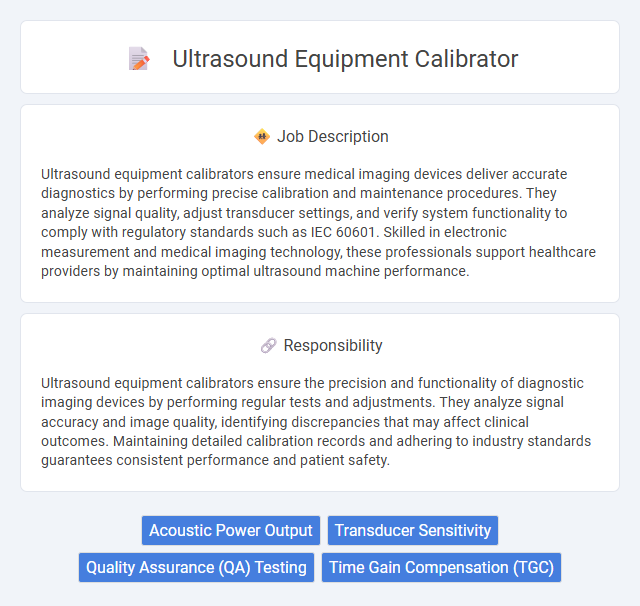
Ultrasound equipment calibrators ensure medical imaging devices deliver accurate diagnostics by performing precise calibration and maintenance procedures. They analyze signal quality, adjust transducer settings, and verify system functionality to comply with regulatory standards such as IEC 60601. Skilled in electronic measurement and medical imaging technology, these professionals support healthcare providers by maintaining optimal ultrasound machine performance.
People with strong attention to detail and steady hands are likely suitable for a job as an ultrasound equipment calibrator, given the precise and technical nature of the work. Those comfortable working with electronic devices and interpreting technical data might find this role fitting their skillset. Individuals who prefer routine, controlled environments over fast-paced or physically demanding tasks probably have a higher probability of thriving in this position.
Qualification
Ultrasound equipment calibrators require strong technical skills in biomedical engineering or electronics, typically verified by a degree or specialized certification. Proficiency in using calibration tools and knowledge of ultrasound technology standards, such as those set by the American Institute of Ultrasound in Medicine (AIUM), is essential. Experience with quality control procedures and familiarity with safety regulations further enhance a candidate's qualifications.
Responsibility
Ultrasound equipment calibrators ensure the precision and functionality of diagnostic imaging devices by performing regular tests and adjustments. They analyze signal accuracy and image quality, identifying discrepancies that may affect clinical outcomes. Maintaining detailed calibration records and adhering to industry standards guarantees consistent performance and patient safety.
Benefit
Ultrasound equipment calibrator jobs likely offer the benefit of ensuring medical devices deliver accurate and reliable diagnostic results, which is crucial for patient safety. Professionals in this role may experience high job demand due to the constant need for maintenance and compliance with health regulations. There is a probable opportunity for skill development and career growth as technology advances in medical imaging equipment.
Challenge
The challenge of working as an ultrasound equipment calibrator likely involves ensuring the highest precision in measurements to maintain diagnostic accuracy. There is probably a need to adapt to rapidly evolving ultrasound technology and complex software updates that require continuous learning. Managing time efficiently while troubleshooting inconsistencies to minimize equipment downtime could also present frequent difficulties.
Career Advancement
Ultrasound equipment calibrators play a vital role in maintaining the accuracy and reliability of diagnostic imaging devices through precise calibration and troubleshooting. Career advancement opportunities include progressing to senior calibration specialist, quality assurance manager, or biomedical equipment technician roles, often requiring certifications such as Certified Radiology Equipment Specialist (CRES). Gaining expertise in advanced ultrasound technologies and compliance standards enhances prospects in healthcare technology management and regulatory affairs.
Key Terms
Acoustic Power Output
Ultrasound equipment calibrators specialize in accurately measuring and adjusting the acoustic power output to ensure medical imaging devices comply with safety and performance standards. Precise calibration of acoustic power output is critical to prevent tissue damage during diagnostic procedures and maintain consistent image quality. This role requires expertise in acoustic metrology, signal processing, and adherence to regulations such as IEC 60601-2-37 for diagnostic ultrasound equipment.
Transducer Sensitivity
Ultrasound equipment calibrators specialize in assessing and adjusting the transducer sensitivity to ensure accurate ultrasound signal output and image quality. Precise calibration of transducer sensitivity is critical for detecting and diagnosing medical conditions, requiring detailed measurements of acoustic pressure and frequency response. Advanced calibrators use reference devices and phantom models to maintain compliance with industry standards such as IEC 60601.
Quality Assurance (QA) Testing
Ultrasound equipment calibrators play a critical role in Quality Assurance (QA) testing by ensuring that diagnostic ultrasound devices meet stringent performance and safety standards. They perform precise calibration and functional tests, identifying deviations and preventing inaccurate imaging results that could impact patient diagnosis. Maintaining regulatory compliance and minimizing equipment downtime are essential outcomes of their QA testing responsibilities.
Time Gain Compensation (TGC)
Ultrasound equipment calibrators specialize in adjusting and verifying Time Gain Compensation (TGC) settings to ensure uniform image brightness across varying tissue depths. Precise calibration of TGC controls compensates for signal attenuation, enhancing diagnostic accuracy and image quality. Regular TGC calibration maintains consistent performance of ultrasound machines, crucial for reliable clinical examinations.
 kuljobs.com
kuljobs.com